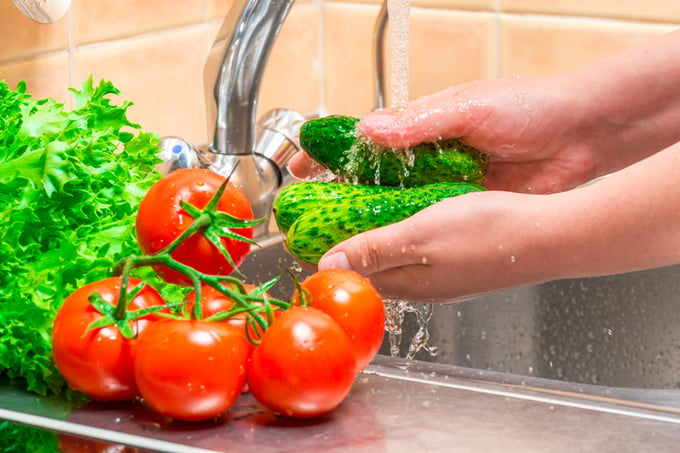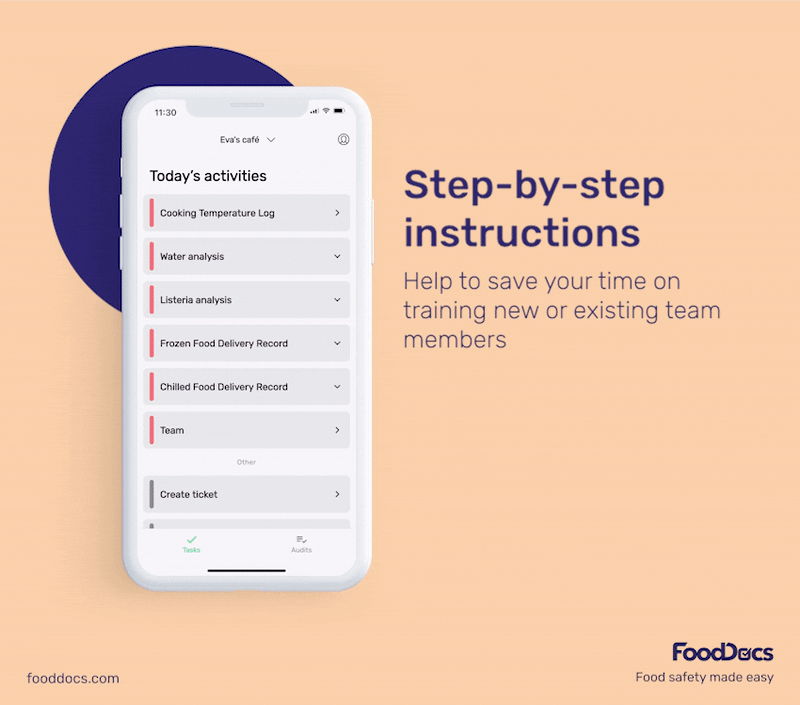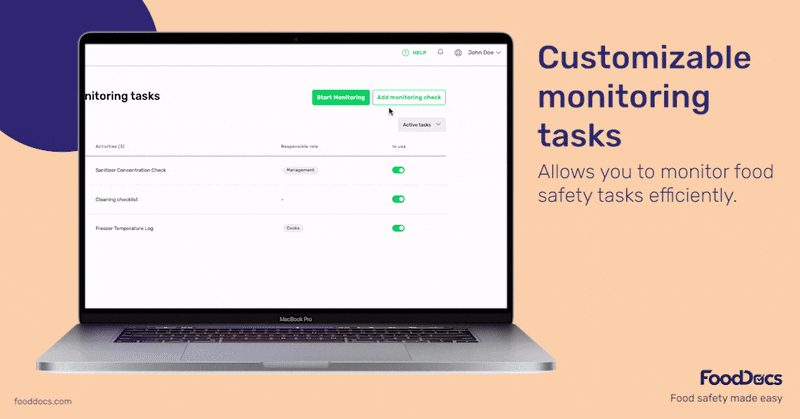Mastering Restaurant Sanitizing: Best Practices for Kitchens and Dining Areas
Master restaurant sanitizing with clear steps for kitchens and dining areas. Learn methods, checklists, and procedures to keep your team safe and...
A food hygiene certificate highlights a business's commitment to serving safe and quality foods.
Food safety hazards are a constant threat to food businesses. These hazards linger around every corner of your kitchen and service area. The newest survey from the Food Standards Agency (FSA) revealed that at least 2.4 million cases of foodborne illnesses occur in the UK every year. Without a proper and broad understanding of food safety and handling practices, these food safety hazards can freely multiply and transfer from one point to another. This scenario can cause a widespread foodborne illness outbreak, which is a nightmare for food business operators. That's why your food handlers must have a legal food hygiene certificate.
Learn more about the ins and outs of getting a food hygiene certificate that can help you achieve a 5-star food hygiene rating.
WHAT WE'LL COVER:
A food hygiene certificate is an official document recognised by significant food authorities given to food handlers who have passed an evaluation for having an adequate amount of food hygiene training.
Although not mandated for food employees, having a food hygiene certificate benefits both the employee and the employer. This certificate is a validation of a food handler's knowledge and capabilities to handle and prepare food in the most hygienic way to prevent the occurrence of foodborne illnesses.
Under a certification programme, food handlers will undergo a series of training modules to refresh their knowledge and an examination as a part of their food training requirements. This process is a mandate for food safety managers and food business owners, whereas it is just an added programme for other food handlers.

To get a food hygiene certificate, you must select a food hygiene certification programme and food hygiene courses, complete a certain level of training and pass the exam.
Once a representative fulfils these steps, the food handler will be awarded a food health and hygiene certificate.
Depending on your chosen level of training, the module and course difficulties and content can vary. Generally, learners are expected to understand key food safety issues, types of hazards, sources of food poisoning, methods of controlling them, and the most efficient way to monitor food safety compliance.
In more advanced training levels, food handlers are taught food safety management systems and how to integrate them into a food business.
Some food hygiene certification programmes, especially online food hygiene courses, are self-paced. This means that the programmes can be paused and continued at the learner's convenience.
The cost of a food hygiene certificate depends on the level and extensiveness of the programme. It can range from as low as £10 up to £200 plus additional VAT per person.
The prices of these food hygiene certification programmes can go lower for group purchases.
Additionally, some certificate providers offer in-house training where they bring the training session to your company. This type of food hygiene certification system would cost more since you are expected to allow a big group to attend the training and can start at £500 plus VAT.
Generally, a food hygiene certificate does not expire, nor is there a legal requirement for food handlers to renew their certificate at any point in time.
Despite this, food safety authorities recommend taking refresher courses and training programmes at least once every three years. While the standard for renewing food hygiene certification is the prerogative of a food company management team, it has been industry practice to undergo renewal every three years.
The basis for this recommendation is the speed at which updates become available for food industry practices and the rate of food safety innovation implementations. For food establishments serving high-risk products, the renewal rate can increase every year.
Failure to renew a food hygiene certificate has no immediate legal consequences. Despite this, there can be indirect effects on both an employer and a food handler. In the case of employers, if a food safety issue occurs and a customer complains, it would negatively affect your reputation if your food handlers have an outdated food hygiene certificate.
On the other hand, failure to renew a health and hygiene certificate can mean that the skills of a food handler are outdated. When seeking employment, an updated food hygiene certificate will be more favoured than an outdated certificate. Renewing your certificate can be done through an online certification programme and at the convenience of your place.

Food hygiene training courses emphasise the need for proper food hygiene and orient participants to the necessary practices to maintain hygienic conditions. Upon completion, awarding bodies provide a food hygiene certificate to qualified participants.
These pieces of training vary in levels and range from level 1 to 4, depending on the degree of difficulty of the training.
Successful completion of each on-site or online food hygiene training will grant the examinee a certificate.
| Cert. level |
For who
|
Topics included
|
|
Level 1
|
Employees with direct contact with food, including waiters, porters, bar staff, and food delivery drivers
|
|
| Level 2 |
All food handlers working in catering, retail, and food production |
|
| Level 3 |
Food safety supervisors and managers |
|
| Level 4 |
Food safety supervisors and managers |
|
For who: For employees with direct contact with food, including waiters, porters, bar staff, and food delivery drivers
Topics included: Personal hygiene, the importance of food safety, cleaning methods, proper cooking, and food safety hazards
The level 1 food hygiene certification programme is an introductory course that includes essential knowledge on handling food to prevent food poisoning outbreaks. It includes an introduction to food safety and training on basic food safety principles and an understanding of food hygiene for employees who serve food directly to customers.
This basic food hygiene certificate programme also includes hygienic practices dedicated to the job roles of waiters, porters, bar staff, and food delivery drivers. The online course introduces basic food safety and hygiene regulations concerning the trainees' job tasks.
Level 1 food and hygiene certifications have food safety courses that help food handlers identify the sources of food safety hazards and the risk of cross - contamination.
For who: All food handlers working in catering, retail, and food production
Topics included: Personal hygiene, the importance of food safety, cleaning methods, proper cooking, food safety hazards, proper storage, allergen management, critical food laws, pest control, and consequences of food contamination.
This food hygiene training is for cooks, baristas, sous chefs, and others who directly handle and package food. Most level 2 food hygiene certification courses are divided into three different sectors:
Food safety level 2 training discusses any relevant food law, food hygiene legislation, food handling practices, explanation of the different aspects of food hygiene, and orientation to food hazards and food spoilage. The training course includes a variety of food hygiene practices and proper preparation of food in a business set-up.
It aims to equip food handlers with the necessary skills to satisfy the basic requirements of Regulation (EC) No. 852/2004, which revolves around the hygiene practices of food workers.
Accredited food agencies give training courses for the specific industry you are in. For example, a Level 2 food safety and hygiene for catering certificate would have particular topics on food legislation in catering.
For who: Food safety supervisors and managers
Topics included: Introduction to food safety, microbiology, contamination and their effects, foodborne illnesses, personal hygiene, construction of food premises, developing control measures, food safety plans, and enforcement of food safety regulations
This intermediate food hygiene certificate programme is for supervisory-level food operators with any admin role. These individuals have the power to delegate tasks and need advanced knowledge of food hygiene.
Strategies to prevent hazards are additionally taught at this level, including the essentials of food hygiene and handling practices. The food and hygiene certification programme also includes introduction to critical food safety legislation.
Food safety authorities recommend that at least one level 3-certified food handler is present for every operation. This requirement ensures that there is someone who knows the business's legal obligations when it comes to food hygiene present in the establishment.
This type of basic food hygiene certificate programme includes food safety courses on effectively controlling food safety hazards while maintaining a strict food hygiene standard.
For who: Food safety supervisors and managers
Topics included: Advanced microbiology, foodborne illnesses, types of food safety hazards, food storage, temperature control, food preservation, designing food premises, personal hygiene, food regulations, training strategies, and management control
Seldomly offered, this programme is for advanced-level food handlers who handle tasks such as the implementation of an HACCP food safety management plan and have a supervisory role. This level includes more technical information on food safety hazards and principles of controlling them.
Most programmes offered for level 4 food hygiene training combine online and on-site training. This certification programme is not recommended to be taken purely online as actual demonstrations and critical discussions are part of the programme. In a level 4 food hygiene certificate system, a participant will be able to learn about the following:
Food safety law requires food handlers to be appropriately trained for their role, but it does not usually mandate possession of a specific named certificate.
In practice, many food businesses use food hygiene certificates as evidence that staff have received suitable training. During inspections, enforcement officers may review training records to confirm that food handlers understand their food safety responsibilities.
The level and frequency of training required depend on:
Although certificates do not expire, maintaining up-to-date food hygiene knowledge is an important part of food safety management. Regular refresher training helps reinforce correct practices, address gaps in understanding, and support ongoing compliance with food safety regulations.
Food businesses are responsible for ensuring that training remains appropriate as operations, menus, or regulations change.
Achieving a food hygiene certificate shows your customers that your team works in the most hygienic way possible. Securing a high-level certificate for the food safety manager even makes the team's approach to food safety more reliable.
Use FoodDocs' smart Food Safety Management System to increase the efficiency and effectiveness of food safety training. Put your food hygiene certificate into good use and unlock its maximum potential using our digital Food Safety Management System (FSMS).
When you sign up with us at FoodDocs for our digital FSMS services, you get the following benefits.
To help you maintain a high level of food hygiene status, we've incorporated essential training instructions into each automatically generated monitoring task. You will get step-by-step instructions, which can be used as a reference for executing or monitoring the task.
Use these instructions to train new employees to help them apply whatever they learned from a food hygiene training course.
You can also upload your versions of the detailed instructions as images or videos.

Detailed instructions from FoodDocs software
The best way to ensure compliance with food hygiene practices is to establish a food safety system with monitoring tasks. With the help of our smart software, you can get automatically generated monitoring tasks based on your daily operations. Save your employees' time by setting these digital monitoring forms to auto-fill and have them automatically filled based on previously entered data.
Some of the essential monitoring tasks and checklists that you can get include the following:

Customisable monitoring tasks from FoodDocs software
In addition, you can also create monitoring tasks from scratch. Make one-off tasks or create detailed checklists that will ensure your team's compliance with food hygiene standards.
Perform evaluations and assessments of your business's compliance with food hygiene standards using our smart auditing tools. When you use our smart software, you can use our auditing features to build a comprehensive checklist of the essential points to check in case an inspection occurs.
Stay current with the standards and analyse your operations for potential gaps or issues that may cause food incidents. Use the information you gather for evaluating and improving your operations.
Our system considers local and international food safety regulations and incorporates the most significant ones based on your location. We understand how your food business may have unique operations. Our digital FSMS monitoring forms can be further customised so you can tailor them to fit your business operations perfectly.
Save up to 20% time on managing your food safety tasks using our system. Get more time to focus on your business operations and increase your sales daily. With our digital FSMS, you can rest easy that your employee's training in food hygiene is put to good use.
Ensure your everyday compliance with food safety regulations by joining us. Book a free demo with our specialist and learn more about how our system can help you secure a food hygiene certificate and maintain compliance.
The level of food hygiene certificate that will benefit you the most depends on your role in the food supply chain. If you intend to serve the food yourself, such as in a catering service, you are recommended to at least have a minimum food hygiene certificate Level 2.
If you are seeking employment as a restaurant waiter, pub attendant, or other frontline food service workforce, a Level 1 food hygiene certification would suffice.
The food hygiene regulations of the UK do not require any food handler to have any food hygiene certificate. This applies to both food handlers and food sellers.
At most, food handlers who are operating with high-risk food preparation must have Level 2 food hygiene training. In addition, food safety managers and supervisors have Level 3 food hygiene training. These hygiene training programs do not need to come with a certificate but must be acquired from an accredited body or legitimate source to ensure the quality of the food hygiene knowledge.
While there is no mandatory food hygiene certificate regulation, food handlers from different levels of the food business are recommended to have a particular food hygiene certificate.
Food handlers who are planning on selling prepacked foods or those who do not have direct contact during the preparation of the food are recommended to have a Level 1 food hygiene certificate. This level promotes awareness and basic knowledge of food and personal hygiene.
If you intend to prepare and sell the products yourself, you may need to obtain a Level 2 food hygiene certificate. Additionally, if you are the owner or food safety manager of a food business, you may need to get a Level 3 food hygiene certificate.
Technically, you are not required to have a food hygiene certificate to gain food business approval, but you must have a food safety management system in place to prevent food safety issues. In addition, you will also need evidence of food hygiene training for your staff and that they have received adequate training and orientation on the significance of food safety.
Generally, food establishments are encouraged at least to have training equivalent to level 2 for food hygiene.
Master restaurant sanitizing with clear steps for kitchens and dining areas. Learn methods, checklists, and procedures to keep your team safe and...
Learn challenges healthcare foodservice teams face today and key food safety practices to protect vulnerable patients. Get a free healthcare leader...
Learn what Standard Operating Procedures (SOPs) are and how to write effective SOPs that ensure consistency, efficiency, and safety in your...